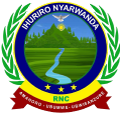II. Rwandan politics and need for Profound Political Reform Rwanda is landlocked and hilly country with a high density of human
settlement. Though linguistically and culturally homogeneous, the population of Rwanda is consisted among others of two large groups, The Hutus and the Tutsis. During the colonial period Rwanda formed part of the German East Africa and later Belgian ruled until Rwanda become independent in 1962.
Rwanda’s government lacks popular legitimacy.
As a result of the limitations that the RPF imposes on the right of other political forces to organize and advocate their policies freely, Rwanda’s government lacks popular legitimacy. The government’s failure to be embraced and supported by its citizens has implications for peace and stability, particularly since the current government is not only repressive, but it is also perceived as a minority regime led by Tutsis at the expense of Hutus, who represent the majority ethnic group in our nation. In reality, the state is controlled by a small group of military officers and a few civilians who do not represent or enjoy the support of the Tutsi community.
